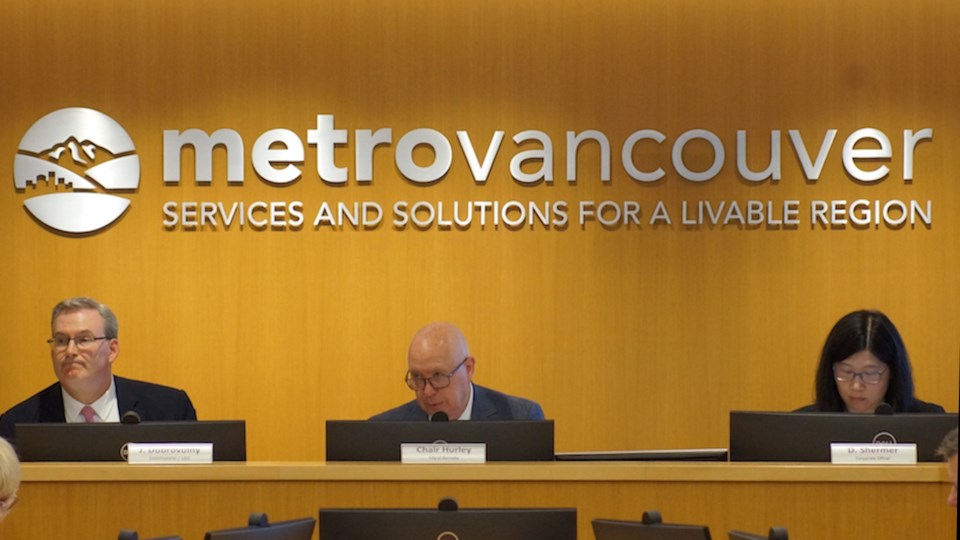Metro Vancouver homeowners are set to face a record-setting property tax increase next year after the regional government’s board of directors approved the 2025 budget Friday.
This year, the average household paid $698 for critical utilities. Next year, the same household will pay $875, a 25.3 per cent increase, on average.
Much of the increase — $98, or 14 per cent — is to account for the commencement of payments for the nearly $4 billion North Shore Wastewater Plant.
The sewage plant project has faced remarkable cost overruns and delays, some only made public earlier this year.
Metro Vancouver is also looking to increase its overall operating tax bill, which accounts for a 9.9 per cent hike for the average household in 2025, on top of the sewage plant costs.
Some regions are facing stiffer increases than others, most notably taxpayers in the North Shore’s three municipalities. For those in the “North Shore Sewerage Area” the property tax bill will rise from $813 this year to $1,147 in 2025 — a 41 per cent increase.
Those in the “Fraser Sewerage Area,” such as Delta, Surrey and Langley, will see their bill increase from $650 to $786, in 2025 — a 20.9 per cent increase.
The board also approved the regional government’s five-year plan, which shows average annual tax increases of five per cent between 2026 and 2029.
North Shore taxpayers to bear brunt of cost overruns
The board voted earlier this year to reject a proposed fully-equitable cost-sharing plan and maintain existing infrastructure payment models that sees sub-regions pay for much of their respective infrastructure. That means North Shore municipalities will bear the brunt of the $2.8 billion cost overrun on the sewage plant still under construction.
The average North Shore household is expected to have an annual tax bill of $1,792 in 2029, nearly double the $903 bill expected to land at the door of the average household south of the Fraser.
Tax increases facing North Shore residents ultimately led City of North Vancouver Mayor Linda Buchanan and District of North Vancouver councillor Lisa Muri to call for an “11th hour” pause to the budget approval process. They sought a target increase of only five to seven per cent on top of the sewage plant costs. Their plan: identify further cost reductions in each department.
“We are spending far beyond our means,” said Buchanen.
She said the 9.9 per cent tax hike in 2025 is “too much for our families and businesses to pay — and it still doesn’t include the wastewater treatment plant.”
Muri expressed frustration at the budget consultation process, claiming that outside in-camera meetings it has been onerous to obtain basic information to share with the public.
Ultimately, the board defeated the motions from the North Shore officials.
$3/day tax rate still good value, say Metro directors
Former chair Sav Dhaliwal said Metro Vancouver taxes are still relatively low and a good deal for homeowners. The bill amounts to about $3 per day for chief services, including water, sewer and regional parks.
Richmond Mayor Malcolm Brodie said even if such a tax reduction was achieved it would only amount to about $20 per household annually. He said it wasn't worth the effort.
Brodie noted the budget task force brought down the original tax increase estimate from 14 per cent to 11 per cent and finally 9.9 per cent after a final review.
The tax hikes come as inflation rates for steel and concrete are in the double digits, far ahead of overall inflation measured by Canada's Consumer Price Index. That justifies the hike, said Dhaliwal.
The regional government is faced with the dual task of building new, expensive infrastructure while renewing existing pipes, plants and reservoirs.
Brodie and Dhaliwal are among the two most longstanding members of the board, which has, after decades, left the regional government without enough money to pay for the future costs of infrastructure upgrades and growth.
Infrastructure costs to be paid for by new home levy, future taxes
Metro Vancouver is also poised to significantly increase development cost charges for new home construction, to pay for new infrastructure associated with a growing population.
“A majority of our budget is driven by capital expenses,” Metro CEO Jerry Dobrovolny told the board during debate Friday.
Over the next five years, Metro Vancouver will spend $10.6 billion on sewage treatment capital projects. Of that, $4 billion is connected to new demand from new housing.
To pay for that bill, Metro is looking to borrow money that will eventually be paid back through $5.8 billion in future taxes and $2.8 billion in development cost charges.
Metro’s operating expenses are also set to rise sharply in coming years, climbing to $2.2 billion in 2029 from $1.2 billion in 2024. The largest increase is for the region's sewage services, where expenses are expected to more than double to $1.2 billion by 2029.




